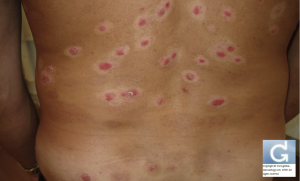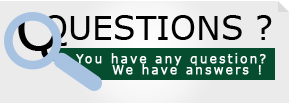Excimer Laser (308nm)(For Professionals)
Presentation
-acts by inducing apoptosis of type T lymphocytes.
-advantage: selective action
-disadvantage: limited treatment surface and expensive
-indications:
- psoriasis :
- we can combine the treatment with steroids and vitamin D derivatives.
- treatment of the plantar type unsatisfactory
- vitiligo:
- doses of 50-200mJ/cm2 (small doses)
- 2 treatment sessions per week for a maximum of 24 weeks (duration of up to 48 weeks if partial response)
- well tolerated
- effective except on the bony proeminences.
- can be combined with topical calcineurin inhibitor; ineffective when combined with vitamin D derivatives.
- mycosis fongoïdes (CTCL):
- T1 and T2 stages (non nodular forms)
- its efficacy has been proven histologically
- 11-21 sessions of treatment are needed.
- alopecia areata (regrowth is observed in 40-60% of treated persons)
- only effective in localised forms of the disease.
- erosive lichen planus? (ineffective according to presenter)
- atopic dermatitis:
- only two polemical studies availables
- controversial result according to present
- no study comparing excimer laser with topical steroids available
- post-inflammatory hypopigmentation:
- few studies are available but likely to be effective as long as maintenance treatment sessions are done.
- white striae (no studies done since 2004…)
- the rest of the indications are controversial (acne, lichen planus) and ineffective according to the presenter.
–Conclusion: the treatment of vitiligo and CTCL is effective. It is less effective for psoriasis and very controversial for other indications.
Contributors:
Dr Christophe HSU – dermatologist. Geneva, Switzerland
Source of information (French): Controverses au sujet du laser (Passeron T), Journées dermatologiques de Paris 2009



